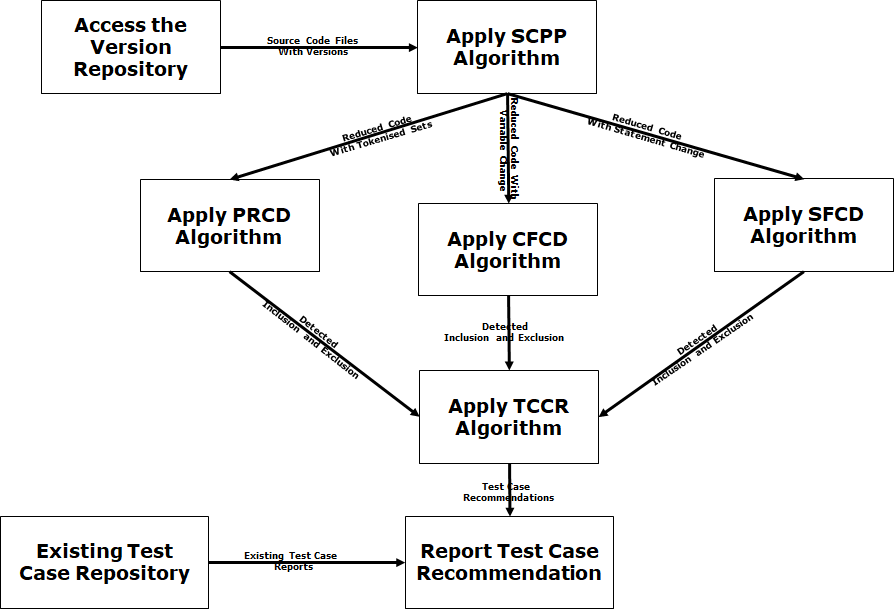An Automated Framework for Detecting Change in the Source Code and Test Case Change Recommendation
Main Article Content
Abstract
Improvements and acceleration in software development have contributed towards high-quality services in all domains and all fields of industry, causing increasing demands for high-quality software developments. The industry is adopting human resources with high skills, advanced methodologies, and technologies to match the high-quality software development demands to accelerate the development life cycle. In the software development life cycle, one of the biggest challenges is the change management between the version of the source codes. Various reasons, such as changing the requirements or adapting available updates or technological upgrades, can cause the source code's version. The change management affects the correctness of the software service's release and the number of test cases. It is often observed that the development life cycle is delayed due to a lack of proper version control and due to repetitive testing iterations. Hence the demand for better version control-driven test case reduction methods cannot be ignored. The parallel research attempts propose several version control mechanisms. Nevertheless, most version controls are criticized for not contributing toward the test case generation of reduction. Henceforth, this work proposes a novel probabilistic rule-based test case reduction method to simplify the software development's testing and version control mechanism. Software developers highly adopt the refactoring process for making efficient changes such as code structure and functionality or applying changes in the requirements. This work demonstrates very high accuracy for change detection and management. This results in higher accuracy for test case reductions. The outcome of this work is to reduce the development time for the software to make the software development industry a better and more efficient world.
Article Details
References
M. Fowler, Refactoring: Improving the Design of Existing Code. Addison-Wesley, 2018.
E. R. Murphy-Hill, C. Parnin, and A. P. Black, "How we refactor, and how we know it," IEEE Transactions on Software Engineering, vol. 38, no. 1, pp. 5–18, 2012.
N. Tsantalis, V. Guana, E. Stroulia, and A. Hindle, "A multidimensional empirical study on refactoring activity," in Conference of the Centre for Advanced Studies on Collaborative Research (CASCON), 2013, pp. 132–146.
M. Kim, T. Zimmermann, and N. Nagappan, "A field study of refactoring challenges and benefits," in 20th Symposium on the Foundations of Software Engineering (FSE), 2017, pp. 50:1–50:11.
Miryung Kim et al., "An empirical study of refactoring challenges and benefits at Microsoft," IEEE Transactions on Software Engineering, vol. 40, no. 7, July 2016.
D. Silva, N. Tsantalis, and M. T. Valente, "Why we refactor? confessions of GitHub contributors," in 24th Symposium on the Foundations of Software Engineering (FSE), 2016, pp. 858–870.
S. Negara, N. Chen, M. Vakilian, R. E. Johnson, and D. Dig, "A comparative study of manual and automated refactorings," in 27th European Conference on Object-Oriented Programming (ECOOP), 2016, pp. 552–576.
J. Ratzinger, T. Sigmund, and H. C. Gall, "On the relation of refactorings and software defect prediction," in 5th Working Conference on Mining Software Repositories (MSR), 2012, pp. 35–38.
G. Soares, R. Gheyi, D. Serey, and T. Massoni, "Making program refactoring safer," IEEE software, vol. 27, no. 4, pp. 52–57, 2010.
S. Demeyer, S. Ducasse, and O. Nierstrasz, "Finding refactorings via change metrics," in ACM SIGPLAN Notices, vol. 35, no. 10, 2010, pp. 166–177.
D. Dig, C. Comertoglu, D. Marinov, and R. Johnson, "Automated detection of refactorings in evolving components," in 20th European Conference on Object-Oriented Programming (ECOOP), 2006, pp. 404– 428.
K. Prete, N. Rachatasumrit, N. Sudan, and M. Kim, "Template-based reconstruction of complex refactorings," in 26th International Conference on Software Maintenance (ICSM), 2010, pp. 1–10.
M. Kim, M. Gee, A. Loh, and N. Rachatasumrit, "Ref-Finder: A refactoring reconstruction tool based on logic query templates," in 8th Symposium on Foundations of Software Engineering (FSE), 2014, pp. 371–372
P. Weissgerber and S. Diehl, "Identifying refactorings from sourcecode changes," in 21st International Conference on Automated Software Engineering (ASE), 2016, pp. 231–240.
Sudhakara, M., Bhavya, K. R., Kumar, M. R., Badrinath, N., & Rangaswamy, K. (2023). Customer Purchase Prediction and Potential Customer Identification for Digital Marketing Using Machine Learning. In AI-Driven Intelligent Models for Business Excellence (pp. 95-111). IGI Global.
Suneel, C. V., Prasanna, K., & Kumar, M. R. (2017). Frequent data partitioning using parallel mining item sets and MapReduce. International Journal of Scientific Research in Computer Science, Engineering and Information Technology, 2(4).
Rudra Kumar, M., Pathak, R., & Gunjan, V. K. (2022). Diagnosis and Medicine Prediction for COVID-19 Using Machine Learning Approach. In Computational Intelligence in Machine Learning: Select Proceedings of ICCIML 2021 (pp. 123-133). Singapore: Springer Nature Singapore.
Kalyani, B. J. D., & Rao, K. R. H. (2018, April). Assessment of physical server reliability in a multi-cloud computing system. In AIP Conference Proceedings (Vol. 1952, No. 1, p. 020045). AIP Publishing LLC.
Kalyani, B. J. D., Meena, K., Murali, E., Jayakumar, L., & Saravanan, D. (2023). Analysis of MRI brain tumor images using deep learning techniques. Soft Computing, 1-8.
Sivaji, U., & Rao, P. S. (2021). WITHDRAWN: Test case minimization for regression testing by analyzing software performance using the novel method.
Sivaji, U., Rao, N. K., Srivani, C., Sree, T., & Singh, M. (2021). A Hybrid Random Forest Linear Model approach to predict heart disease. Annals of the Romanian Society for Cell Biology, 25(6), 7810-7814.

